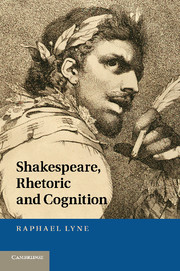Book contents
- Frontmatter
- Contents
- Acknowledgments
- Chapter 1 Introduction: ‘pity, like a naked new-born babe’
- Chapter 2 Metaphor and synecdoche in cognition
- Chapter 3 The drift towards cognition in rhetorical manuals
- Chapter 4 A Midsummer Night’s Dream
- Chapter 5 Cymbeline
- Chapter 6 Othello
- Chapter 7 The Sonnets
- Conclusion
- Notes
- Bibliography
- Index
Chapter 4 - A Midsummer Night’s Dream
Published online by Cambridge University Press: 07 September 2011
- Frontmatter
- Contents
- Acknowledgments
- Chapter 1 Introduction: ‘pity, like a naked new-born babe’
- Chapter 2 Metaphor and synecdoche in cognition
- Chapter 3 The drift towards cognition in rhetorical manuals
- Chapter 4 A Midsummer Night’s Dream
- Chapter 5 Cymbeline
- Chapter 6 Othello
- Chapter 7 The Sonnets
- Conclusion
- Notes
- Bibliography
- Index
Summary
The main consequence of the connections made in the previous chapters is a different way of reading some of the more dazzling but abstruse passages in Shakespeare. The richness of Shakespeare’s language, and the potential for tension between its extraordinary energy and the concept of mimesis – the representation of reality – is opened up by the observation that its tropes are in more than one way involved in the process of thinking as well as the results of speaking. In the four chapters that follow there will be some unusually extended discussions of the intricacies of language. If these tend towards tediousness at times, then at least the exhaustiveness has a point. In some of these dramatic moments it will end up seeming most plausible to assume that these metaphorical tangles leave the audience with an impression, rather than a precise anatomy, of what might be drawn out in a heated dramatic moment. Nevertheless the contribution of these tangles to such moments still needs to be considered carefully, because no one rhetorical crisis is quite like another.
One speech in particular obliges this play’s inclusion. It represents an extreme example of rhetorical cognition, and a stark contrast with Macbeth and his thoughts on pity. In both cases the attempt to comprehend things better is a kind of failure; in A Midsummer Night’s Dream, it is a comical failure. Bottom wakes up under the illusion that he is still rehearsing a play. He soon notices his friends have gone, and then he turns to think about his dream:
When my cue comes, call me, and I will answer. My next is, ‘Most fair Pyramus.’ Heigh-ho! Peter Quince! Flute the bellows-mender! Snout the tinker! Starveling! God’s my life, stol’n hence, and left me asleep! I have had a most rare vision. I have had a dream, past the wit of man to say what dream it was. Man is but an ass, if he go about t’ expound this dream. Methought I was – there is no man can tell what. Methought I was, and methought I had, but man is but a patch’d fool, if he will offer to say what methought I had. The eye of man hath not heard, the ear of man hath not seen, man’s hand is not able to taste, his tongue to conceive, nor his heart to report, what my dream was. I will get Peter Quince to write a ballet of this dream. It shall be call’d ‘Bottom’s Dream,’ because it hath no bottom; and I will sing it in the latter end of a play, before the Duke. Peradventure, to make it the more gracious, I shall sing it at her death.
(4.1.200–19)- Type
- Chapter
- Information
- Shakespeare, Rhetoric and Cognition , pp. 100 - 131Publisher: Cambridge University PressPrint publication year: 2011



